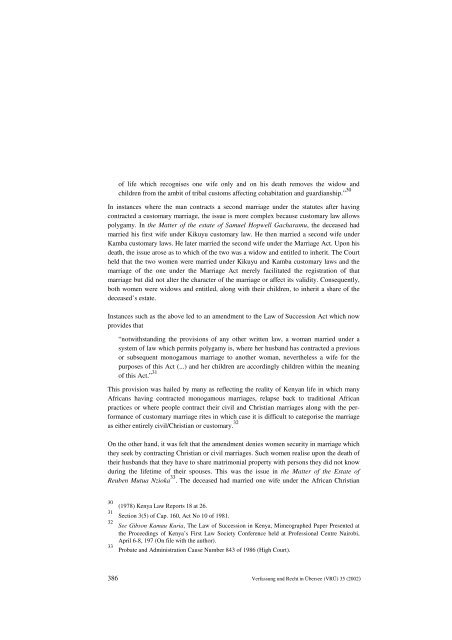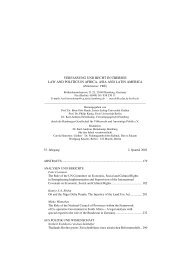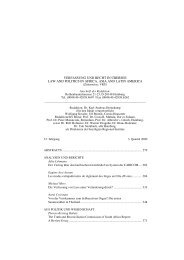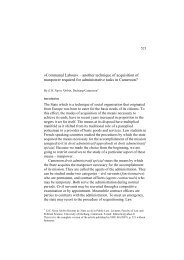Ganzes Heft zum Download (Pdf) - Zeitschrift Verfassung und Recht ...
Ganzes Heft zum Download (Pdf) - Zeitschrift Verfassung und Recht ...
Ganzes Heft zum Download (Pdf) - Zeitschrift Verfassung und Recht ...
You also want an ePaper? Increase the reach of your titles
YUMPU automatically turns print PDFs into web optimized ePapers that Google loves.
386<br />
of life which recognises one wife only and on his death removes the widow and<br />
children from the ambit of tribal customs affecting cohabitation and guardianship.” 30<br />
In instances where the man contracts a second marriage <strong>und</strong>er the statutes after having<br />
contracted a customary marriage, the issue is more complex because customary law allows<br />
polygamy. In the Matter of the estate of Samuel Hopwell Gacharamu, the deceased had<br />
married his first wife <strong>und</strong>er Kikuyu customary law. He then married a second wife <strong>und</strong>er<br />
Kamba customary laws. He later married the second wife <strong>und</strong>er the Marriage Act. Upon his<br />
death, the issue arose as to which of the two was a widow and entitled to inherit. The Court<br />
held that the two women were married <strong>und</strong>er Kikuyu and Kamba customary laws and the<br />
marriage of the one <strong>und</strong>er the Marriage Act merely facilitated the registration of that<br />
marriage but did not alter the character of the marriage or affect its validity. Consequently,<br />
both women were widows and entitled, along with their children, to inherit a share of the<br />
deceased’s estate.<br />
Instances such as the above led to an amendment to the Law of Succession Act which now<br />
provides that<br />
“notwithstanding the provisions of any other written law, a woman married <strong>und</strong>er a<br />
system of law which permits polygamy is, where her husband has contracted a previous<br />
or subsequent monogamous marriage to another woman, nevertheless a wife for the<br />
purposes of this Act (...) and her children are accordingly children within the meaning<br />
of this Act.” 31<br />
This provision was hailed by many as reflecting the reality of Kenyan life in which many<br />
Africans having contracted monogamous marriages, relapse back to traditional African<br />
practices or where people contract their civil and Christian marriages along with the performance<br />
of customary marriage rites in which case it is difficult to categorise the marriage<br />
as either entirely civil/Christian or customary. 32<br />
On the other hand, it was felt that the amendment denies women security in marriage which<br />
they seek by contracting Christian or civil marriages. Such women realise upon the death of<br />
their husbands that they have to share matrimonial property with persons they did not know<br />
during the lifetime of their spouses. This was the issue in the Matter of the Estate of<br />
Reuben Mutua Nzioka 33 . The deceased had married one wife <strong>und</strong>er the African Christian<br />
30<br />
(1978) Kenya Law Reports 18 at 26.<br />
31<br />
Section 3(5) of Cap. 160, Act No 10 of 1981.<br />
32<br />
See Gibson Kamau Kuria, The Law of Succession in Kenya, Mimeographed Paper Presented at<br />
the Proceedings of Kenya’s First Law Society Conference held at Professional Centre Nairobi,<br />
April 6-8, 197 (On file with the author).<br />
33<br />
Probate and Administration Cause Number 843 of 1986 (High Court).<br />
<strong>Verfassung</strong> <strong>und</strong> <strong>Recht</strong> in Übersee (VRÜ) 35 (2002)











